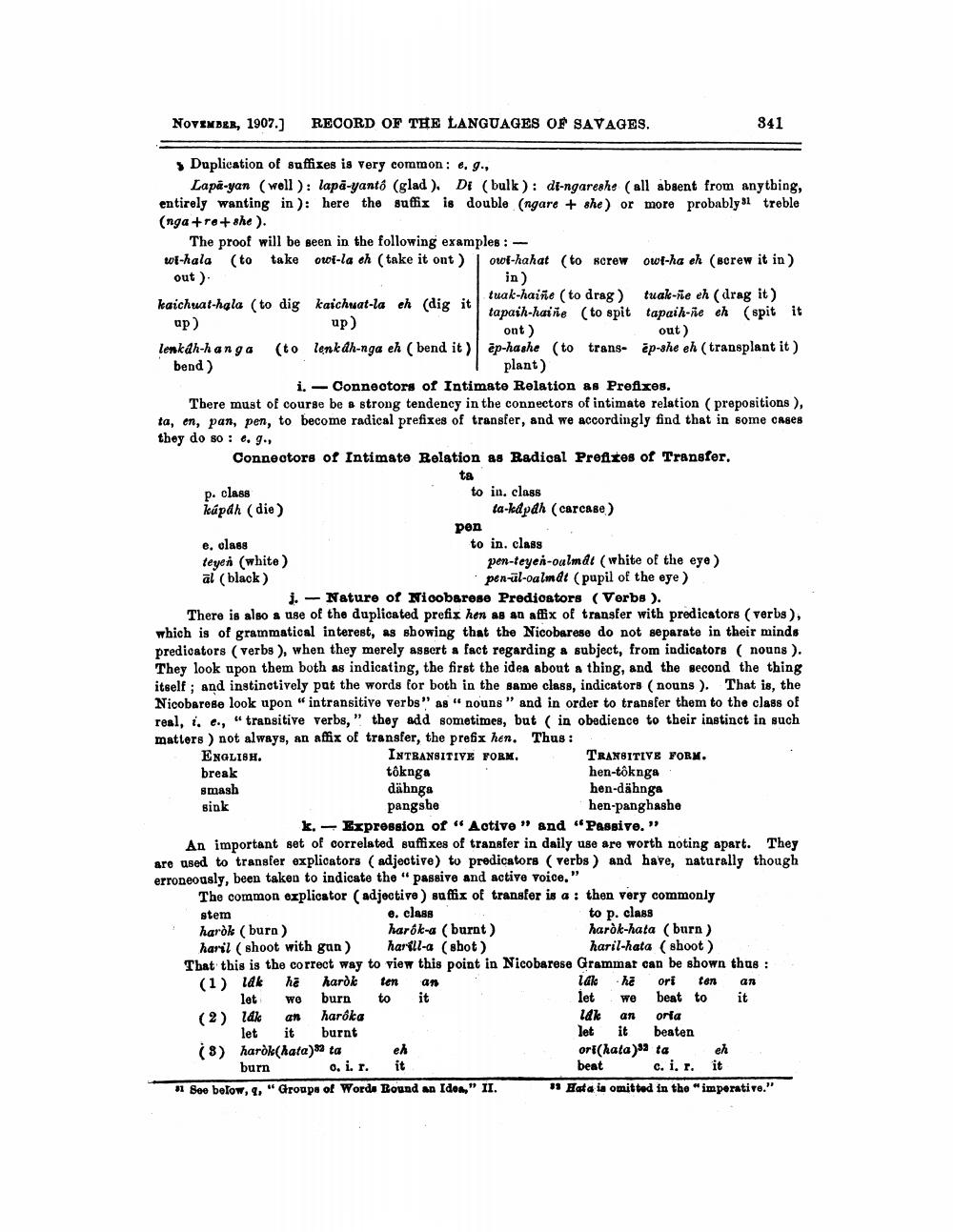________________
NOVEMBER, 1907.) RECORD OF THE LANGUAGES OF SAVAGES.
841 -
Duplication of suffixes is very common: e..,
Lapa-yan (well): lapa-yantó (glad ), Di (bulk): di-ngareshe (all absent from anything, entirely wanting in ): here the suffix is double (ngare + she) or more probably $1 treble (nga +re+she).
The proof will be seen in the following examples :wf-hala (to take owi-la ch take it ont) | out-hahat (to screw out-ha eh (screw it in ) out)
in)
tuak-haiñe (to drag) tuak-ne eh (drag it) kaichuat-hala (to dig kaichuat-la eh (dig it
tapaih-haine (to spit tapaih-ne eh (spit it ap) up)
ont)
out) lenkáh-hanga (to lenkdh-nga eh ( bend it) ép-hashe (to trans- ép-she eh (transplant it) bend)
plant) i. - Connectors of Intimate Relation as Prefixes. There must of course be a strong tendency in the connectors of intimate relation (prepositions ), ta, en, pan, pen, to become radical prefixes of transfer, and we accordingly find that in some cases they do so : e. g., Connectors of Intimate Relation as Radical Prefixes of Transfer,
ta p. Class
to in class kápah (die)
ta-kdpah (carcase)
pen
e, class
to in. class teyer (white )
pen-leyeh-oalmdt (white of the eye) al (black)
pen-ül-oalmát (pupil of the eye), j. - Nature of Nicobarese Predicators (Verbs). There is also a use of the duplicated prefix hen as an affix of transfer with predicators (verbs), which is of grammatical interest, as showing that the Nicobarese do not separate in their minds predicators (verbs ), when they merely assert a fact regarding a subject, from indicators ( nouns). They look upon them both as indicating, the first the idea about a thing, and the second the thing itself; and instinctively put the words for both in the same class, indicators (nouns). That is, the Nicobarese look upon "intransitive verbs" as " nouns" and in order to transfer them to the class of real, i, e., "transitive verbs,” they add sometimes, but ( in obedience to their instinct in such matters ) not always, an affix of transfer, the prefix hen. Thus : ENGLISH. INTRANSITIVE FORM.
TRANSITIVE FORM. break tôknga
hen-toknga smash dähnga
hen-dähnga sink pangshe
hen-panghashe k. - Expression of " Active" and "Passive." An important set of correlated suffixes of transfer in daily use are worth noting apart. They are used to transfer explicators (adjective) to predicators (verbs ) and have, naturally though erroneously, been taken to indicate the "passive and active voice."
The common oxplicator (adjective) suffix of transfer is a : then very commonly stem e. class
to p. class haròk (burn) harők-a (burnt)
haròk-hata (burn) haril shoot with gan ) harfll-a (sbot)
haril-hata (shoot) That this is the correct way to view this point in Nicobarese Grammat can be shown thus : (1) idk hi harok ten an
lak he ori ten an let wo burn to it
let we beat to it (2) Idkan haroka
ilk an oria let it burnt
let it beaten (8) haròk(hata) ta eh
orl(hata)sa ta en burn 0. i. 1. it
beat c.i.r. it 11 See below, , "Groape of Word. Round an Idos," II. * Hata ia omitted in the "imperative."




